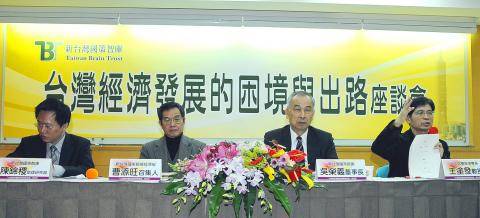Taiwan Brain Trust yesterday said it would not oppose the Economic Cooperation Framework Agreement (ECFA) as long as Beijing did not prevent Taiwan from signing free-trade agreements (FTA) with other major trading partners. However, it criticized the government’s economic policy — and its reliance on China — as flawed and misguided.
The trust’s chairman, former vice premier Wu Rong-i (吳榮義), said China represented about 70 percent of the nation’s total overseas investment, while 42 percent of Taiwan’s exports went to China and Hong Kong, making Taiwan economically vulnerable via-a-vis China.
“We must rethink our global economic strategy. In particular, we must strengthen the cooperative relationship with advanced countries,” he told a conference on ways to address Taiwan’s economic development dilemma.

PHOTO: WANG YI-SUNG, TAIPEI TIMES
Wu said the administration’s had three myths about economic policy: it thought China was the only option for repairing Taiwan’s economy; it thought economic growth was everything and failed to realize that economic growth did not necessarily improve the quality of life or narrow the wealth gap; and it thought big businesses deserved preferential tax cuts, while ignoring the economically disadvantaged, small and medium-sized businesses and residents of central and southern Taiwan, where resources were inadequate compared with what is allocated to the north.
Wu said the administration should increase its cooperation with developed countries, emphasize creating jobs rather than economic growth, improve the investment environment, restructure finances and reform the tax system, allocate national resources more reasonably and commit to sustainable development.
“The purpose of a government’s existence is to let its people live a good life,” he said. “Being happy is not only about making more money or [achieving] higher economic growth. It is also about guaranteeing their jobs, quality of life, physical and mental health, confidence and dignity, social harmony and national security.”
Chen Jinji (陳錦稷), a research fellow at the trust, said the administration’s economic policy was seriously mistaken because of the three myths mentioned by Wu.
“The government’s economic policy not only fails to solve problems, it makes things worse,” he said. “When a government gets the problem wrong and prescribes the wrong medicine, the result is a government that is ineffectual.”
Tsaur Tien-wang (曹添旺), convener of the trust’s economics department, said he was concerned about the ECFA’s negative impact, saying that when a smaller economy integrates with a bigger one, it is easier for the smaller one to become marginalized in terms of employment, investment and income.
The only way out is for the smaller economy to develop economic ties with other countries and sign FTAs, he said.
This applies to Taiwan, he said, -adding that Taiwan’s future would be -limited if China continues to block its efforts to sign FTAs with Taiwan’s major economic partners.

An essay competition jointly organized by a local writing society and a publisher affiliated with the Chinese Communist Party (CCP) might have contravened the Act Governing Relations Between the People of the Taiwan Area and the Mainland Area (臺灣地區與大陸地區人民關係條例), the Mainland Affairs Council (MAC) said on Thursday. “In this case, the partner organization is clearly an agency under the CCP’s Fujian Provincial Committee,” MAC Deputy Minister and spokesperson Liang Wen-chieh (梁文傑) said at a news briefing in Taipei. “It also involves bringing Taiwanese students to China with all-expenses-paid arrangements to attend award ceremonies and camps,” Liang said. Those two “characteristics” are typically sufficient

A magnitude 5.9 earthquake that struck about 33km off the coast of Hualien City was the "main shock" in a series of quakes in the area, with aftershocks expected over the next three days, the Central Weather Administration (CWA) said yesterday. Prior to the magnitude 5.9 quake shaking most of Taiwan at 6:53pm yesterday, six other earthquakes stronger than a magnitude of 4, starting with a magnitude 5.5 quake at 6:09pm, occurred in the area. CWA Seismological Center Director Wu Chien-fu (吳健富) confirmed that the quakes were all part of the same series and that the magnitude 5.5 temblor was

The brilliant blue waters, thick foliage and bucolic atmosphere on this seemingly idyllic archipelago deep in the Pacific Ocean belie the key role it now plays in a titanic geopolitical struggle. Palau is again on the front line as China, and the US and its allies prepare their forces in an intensifying contest for control over the Asia-Pacific region. The democratic nation of just 17,000 people hosts US-controlled airstrips and soon-to-be-completed radar installations that the US military describes as “critical” to monitoring vast swathes of water and airspace. It is also a key piece of the second island chain, a string of

The Central Weather Administration has issued a heat alert for southeastern Taiwan, warning of temperatures as high as 36°C today, while alerting some coastal areas of strong winds later in the day. Kaohsiung’s Neimen District (內門) and Pingtung County’s Neipu Township (內埔) are under an orange heat alert, which warns of temperatures as high as 36°C for three consecutive days, the CWA said, citing southwest winds. The heat would also extend to Tainan’s Nansi (楠西) and Yujing (玉井) districts, as well as Pingtung’s Gaoshu (高樹), Yanpu (鹽埔) and Majia (瑪家) townships, it said, forecasting highs of up to 36°C in those areas